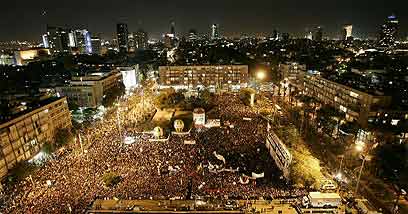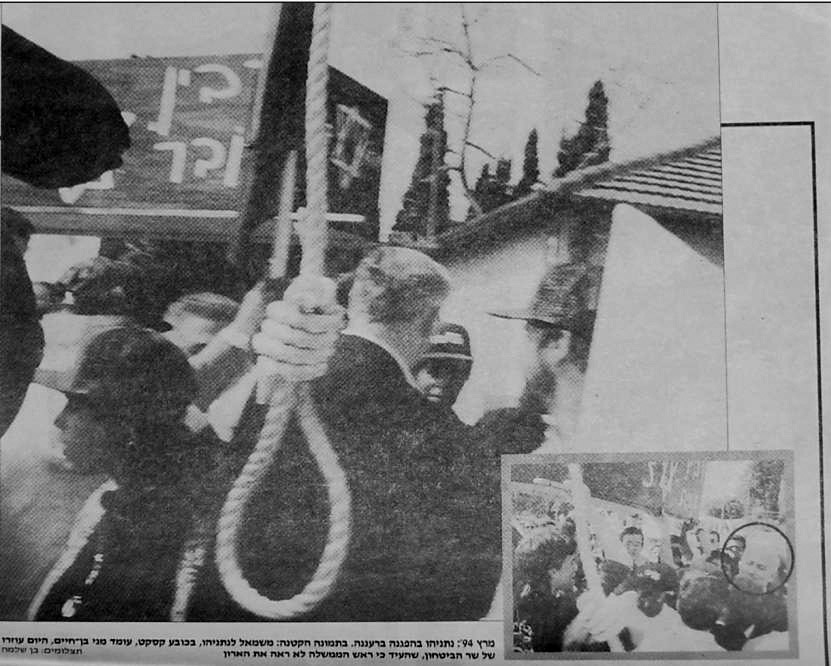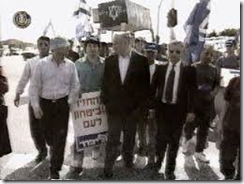Jerusalem
is the capital of Israel, the center of the Jewish people, whether the American
President says so or not, and whether the Palestinians accept it or reject it.
Hopefully
the Arab part of Jerusalem,
what in Arabic is
Al-Quds will, one day, also be the capital of a Palestinian State. Not instead
of Jewish Jerusalem, but alongside.
The
Palestinians and other Arab countries have tried to deny the intimate and historic link between the Jewish people and
Jerusalem - rather successfully so for instance at
UNESCO.
It would
be conducive, if the Palestinians recognize Israel’s right to exist as a Jewish
and democratic state, just like Israel needs to recognize the legitimate right
of the Palestinians to establish a separate Arabic State alongside Israel –
something which the present extreme right-wing Netanyahu government does not
do.
Israel needs to recognize that today there is a national Palestinian identity, which requires the boundaries of statehood to crystallize in its collective colors, differently from a collective identity which relies on the denial of the other side's rights. Likewise, the Palestinians need to recognize Jewish, Hebrew and Israeli history - which includes not claiming that the Dead Sea Scrolls, for instance, is part of the Palestinian heritage, rather than Hebrew.
A one-state
solution is not a viable option, only a prescription for never-ending violence.
There are
many possible roads toward a two-state solutions even in times characterized by animosity
and frustration, though it may not be carried out by the three limping leaders –
Trump, corrupt Netanyahu, Abbas who hangs on to power though he was supposed to stand for re-election nearly a decade ago but hangs on to power.
Regarding
the boundaries and borders of Jerusalem, one of the most practical suggestions
has been presented by the Geneva
Initiative:
The following
is excerpted from the beginning of my chapter on Jerusalem, published in Tom
Singer’s (ed.) excellent volume Psyche and the City: A Soul’s Guide to the
Modern Metropolis.
Human Ground, Archetypal Spirit
Unlike Rome, not all roads
lead to Jerusalem, and those that do may all too easily lead the visitor astray
in a labyrinth of divinity and madness. In the course of history, when Rome became the center of power, sanctity and glory, Jerusalem
One may
conveniently approach Jerusalem from the west, ascending the modern highway,
which climbs eastward through the Judean Hills–like a Western mind moving
toward the Orient.[3] By
approaching Jerusalem Jerusalem
Alternatively,
one may proceed toward Jerusalem
One may
capture Jerusalem by drawing the sword against evil spells, as did King David
from the Jebusites three millennia ago, or enter the city humbly on a donkey,
like Jesus did and any future Messiah is supposed to do as well, or like the
Caliph Omar majestically riding on a white camel. In whatever way one arrives,
the visitor must be ready to overcome the obstacles of Earthly Jerusalem, which
far from always mirrors her Heavenly Sister’s image of completeness and
redemption.
“Crouched among its hills,”[4]
Jerusalem is immersed with mythological, religious, and symbolic significance.
Yet, scarce in natural resources, the surrounding land is cultivated rather
than fertile by nature, and the so-called Jerusalem stone, the pale limestone
that characterizes many of the city houses, nearly cracks and shatters by
carrying the burden of Heavenly Jerusalem. In its often shabby garb,
terrestrial Jerusalem Jerusalem
Significant
Dates in the History of Jerusalem
Jerusalem
dates back to the fourth millennium B.C.E. It became a permanently settled
Canaanite city in the nineteenth Century B.C.E, mentioned in the Egyptian
Execration Texts as Rushlamem.[9]
The Bible first mentions Jerusalem in Genesis 14:18-20, when Melchizedek, “king
of Shalem,” greeted and blessed Abram upon his arrival. According to the Biblical
narrative, it was a small, fortified Jebusite city for about two centuries until
captured and made capital by King David in the tenth century B.C.E., after he
had ruled for seven years in Hebron. He brought the Ark of the Covenant,
holding the stone tablets with the engraved Ten Commandments, to Jerusalem Ark was later placed in the Holy of Holies in the Temple Temple
The Hellenistic
period began with Alexander the Great’s conquest of Jerusalem in 332 B.C.E. Following
the Maccabean revolt the Jews recaptured Jerusalem and restored the Temple in
164 B.C.E. However, a century later General Pompey captured the city. The
Romans would reign until the beginning of the Byzantine period, 324 C .E.
Jesus, born ca. 6/5 B.C.E., towards the end of the great and cruel King Herod’s
reign, was crucified at the hill of Golgotha, then outside the ancient walls, probably
in 30 C .E.
The Church of the Holy Sepulchre, inside the present walls surrounding the old
city, was built by Emperor Constantine early in the fourth century, likely at
the site of crucifixion.
The Second Temple was destroyed, presumably on the same day as the
destruction of the first Temple, on the ninth of the Hebrew month Av, late
summer 70 C .E.,
which for the observant Jew is a day of fasting and mourning the destruction of
Jerusalem. Yet, Talmudic legend raises the idea of transformation, suggesting
that the day of destruction signifies the birth of the Messiah. After defeating
the revolt of Bar Kokhba in 135
C .E., the Roman Emperor Hadrian renamed the destroyed
city Aelia Capitolina. He prohibited the Jews from entering the city, and on
the ruins of the former temple, he built one to the worship of Jupiter.
The Byzantine period lasted from the beginning of the fourth to the
middle of the seventh century, followed by the Muslim period. The al-Aqsa–i.e.,
“the furthest”–Mosque was built at the Temple Mount during the Umayyad period,
early eighth century.
The Crusaders ruled from 1099, barring non-Christians from the city,
which then was captured by Saladin in 1187. Following the Mameluk period, Jerusalem
and the Holy Land were conquered by the Ottoman Empire in the early sixteenth
century. Sultan Suleiman I, alternatively called the Magnificent and the
Lawgiver, rebuilt the city walls, which had been razed three centuries earlier.
The Cities:
Bangalore • Berlin • Cairo • Cape Town • Jerusalem • London • Los Angeles • Mexico City • Montreal • Moscow • New Orleans • New York • Paris • San Francisco • Sao Paulo • Shanghai • Sydney • Zurich
The Contributors:
Paul Ashton • Gustavo Barcellos • John Beebe • Nancy Furlotti • Jacqueline Gerson • Christopher Hauke • Thomas Kelly • Thomas Kirsch • Antonio Karim Lanfranchi • Charlotte Mathes • Elena Pourtova • Kusum Dhar Prabhu • Joerg Rasche • Craig San Roque • Erel Shalit • Heyong Shen • Thomas Singer • Murray Stein • Craig Stephenson • Viviane Thibaudier • Beverley Zabriskie • Luigi Zoja
Psyche and the City is available on Amazon and other sellers.
[1]
Cf. Martin
Goodman, Rome and Jerusalem: The Clash of Ancient Civilizations (New
York: Vintage, 2008), for the history of the two cities and the civilizations
they represent.
[3] It is by facing the orient, the east where the sun rises, that we
find our way, i.e., orientate ourselves.
[5]
“And Jacob awoke from his sleep, and he said,
Surely the Lord is in this place; and I knew it not. And he was afraid, and
said, How awesome is this place! this is no other but the house of God, and
this is the gate of heaven” (Genesis 28:17). Rabbinic folklore (midrash) says
that while the foot of Jacob’s ladder was in Bet El, the top, which reached the
gates of heaven, was in Jerusalem
[6] “And they shall call
Jerusalem the Dwelling Place
[7] Isaiah 51:3; Song of Songs, e.g. 7:1. The
eleventh century Rabbi Ibn Ezra interprets the Shulamite here to represent
Jerusalem.
[8] Ezekiel 16.



































